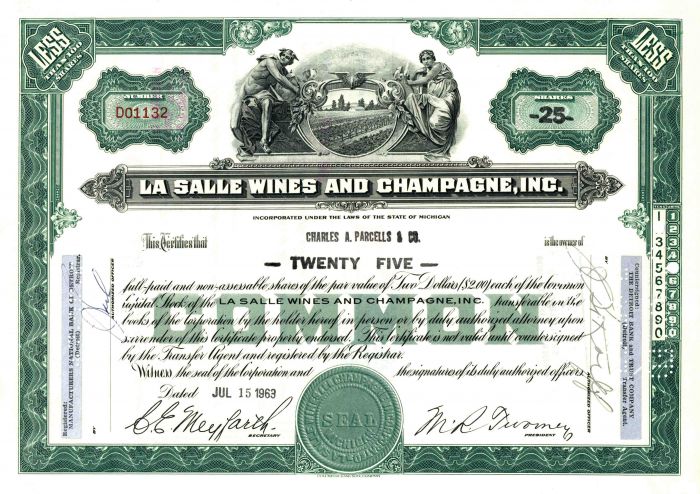La Salle Wines and Champagne, Inc. - Spirits Stock Certificate
Inv# BR1024 Stock
Stock printed by Columbian Bank Note Company. Rare Topic!
The traditional wines of Michigan were sweet wines, often made from grape varieties native to North America, such as the Catawba, Concord, and Niagara, or from hybrid grapes partly developed by crossing native species with vinifera grapes. North American native grapes have the advantage of being adapted to local growing conditions, with consequent high fruit yield. In addition, growers can switch back and forth between the production of sweet wine and grape juice. Of Michigan's 14,600 acres (5,900 ha) under grape cultivation, only 12%, 1,800 acres (730 ha), were devoted to wine grapes as of 2007.
Michigan's wine industry dates from 1780s, Monroe the birthplace of Michigan wine industry The state's first true wine region was established in Monroe at Frenchtown. The River Raisin flows for almost 139 miles in that area, and there were so many grapes growing naturally along its banks when French settlers arrived in the 1780s that they named it after the sun-dried fruit and were making good wine as many were farmers and many had trading posts. By the mid-1800s, a viable wine industry had been established in Monroe County.The traditional wines of Michigan were sweet wines, Today, there are well over one hundred, as well as 13,700 acres of vineyards. That makes Michigan the fourth largest grape-growing state. Michigan’s commercial wineries bottle more than 2.7 million gallons of wine annually, making Michigan fifth in wine production, and the vast majority of that production is from Michigan-grown grapes.
With large plantings of Concord in the southwest, mostly for the Welch Grape Juice Company, the state was well positioned to enter wine production. Four large wineries (out of eleven wineries established by 1946) came to produce almost all Michigan wine: La Salle Wine and Champagne Company which was established in Windsor, Ontario, and moved to Farmington, Michigan; the Bronte Champagne and Wines Company of Hartford; Michigan Wineries (now Tabor Hill Winery) of Buchanan; and St. Julian Winery, which was also established in Windsor, Ontario, on the Canadian shore across from Detroit during Prohibition and moved to Paw Paw, Michigan, after repeal.
To promote the local industry, Michigan law in the mid-20th century placed a tax of four cents per U.S. gallon on Michigan wine while other wine was taxed at 50 cents per U.S. gallon. Michigan wine of that era was, primarily, fermented to dryness, giving about 9% alcohol, and then fortified with California brandy to 16% alcohol. State laws considered this natural wine and allowed it to be sold in grocery and drug stores while fortified wines from out of state, produced to 18-20% alcohol, could only be sold from state liquor stores.
The wineries of Michigan specialized in sweet wine and fruit wine well into the 1970s. With the growth in demand, starting in the latter half of the 20th century, for locally grown and locally labeled U.S. fine wines, several existing Michigan makers of sweet wine experimented with upgrading their production, and new vintners entered the scene. Tabor Hill Winery, in southwest Michigan, opened in 1971 as the first Michigan winery specializing in vinifera wines. Only a few years later in 1974, Chateau Grand Traverse opened in the Traverse Bay region of Northern Michigan. A slow growth in the number of wineries and continued trials of different vinifera varieties continued well into the 2000s. Presently, various hybrid varieties are being looked at which could allow grape growing in the Upper Peninsula to expand significantly over the next several years.
A stock certificate is issued by businesses, usually companies. A stock is part of the permanent finance of a business. Normally, they are never repaid, and the investor can recover his/her money only by selling to another investor. Most stocks, or also called shares, earn dividends, at the business's discretion, depending on how well it has traded. A stockholder or shareholder is a part-owner of the business that issued the stock certificates.









Ebay ID: labarre_galleries